Mould and mildew are real problems for many homeowners. They not only create health problems but also cause costly damage to buildings, such as areas of rot and foul odors that can extend through an entire house.
Traditional methods of insulation offer limited protection against mould, whereas spray foam insulation provides superior resistance to moisture build-up and prevents mould growth, making it one of the most effective solutions for safeguarding your home from the destructive effects of mould.
In this comprehensive guide, we’ll discuss everything you need to know about preventing mould with spray foam insulation, from installation tips to potential benefits, so you can ensure your home is free from water damage and its health risks.
What Is Spray Foam Insulation?
Spray foam insulation is a relatively new form of insulation, quickly gaining popularity due to its superior protection against air and moisture infiltration. The two main types of spray foam insulation are open-cell and closed-cell.
Open-cell spray foam has smaller cells, which create an expandable, lightweight material. This type of insulation is generally used for interior walls, attics, and other areas where soundproofing is desired.
Closed-cell spray foam insulation has a more robust dense cell structure that provides superior air and water infiltration protection. It is often used to insulate exterior walls, foundations, and roofs as it can provide an extra layer of protection against moisture damage.
When it comes to spray foam insulation installation, hiring professionals such as iFOAM for the job is always recommended. This is because the process requires specialized equipment, and special safety precautions must be taken, as spray foam insulation contains hazardous chemicals that can cause respiratory irritation if inhaled.
Why Is It Important to Prevent Mould?
Mould can cause significant damage to your home and the health of those who live in it. It thrives in areas with high humidity and damp conditions, so preventing mould growth should always be a priority. Mould spores are easily spread through the air, making them difficult to contain once they grow. Inhaling these spores can lead to respiratory issues, including coughing, sneezing, and sinus congestion.
It can also cause allergic reactions in some people, leading to skin rashes and eye irritation. In addition to these health concerns, mould can damage your home’s structure by eating away at insulation materials and wood framing. Moreover, mould can cause costly damage to your home. If left unchecked, it can spread quickly and require extensive clean up and repair. Taking the necessary steps to prevent mould growth can save you time, money, and stress in the long run.
How Does Spray Foam Insulation Help Prevent Mould?
Spray foam insulation provides an effective barrier against moisture, mould, and mildew. Unlike traditional forms of insulation, spray foam can fill any gaps or voids in the wall structure, eliminating potential entry points for moisture that could lead to mould growth. The foam also expands as it dries, creating a tight seal around windows and doors that prevents air leakage and helps keep humidity levels in your home low. This helps reduce the likelihood of mould growth and keeps your home comfortable year-round.
Moreover, spray foam has the added benefit of being an effective soundproofing material, which can help reduce noise from outside sources like traffic or construction. This makes your home more comfortable and helps prevent the spread of mould spores throughout your home, as sound vibrations can cause them to become airborne and travel to other areas of the house.
In summary, benefits of spray foam insulation for mould prevention include:
- Superior moisture control: Spray foam insulation can effectively seal off all potential entry points for moisture, preventing buildup that could lead to mould growth.
- Complete insulation: This material expands to fill gaps and voids in the wall structure, ensuring comprehensive insulation and eliminating spaces where mould can grow.
- Improved air quality: By preventing moisture and, subsequently, mould, the air quality in your home improves, reducing potential health risks associated with mould exposure.
- Soundproofing: Besides its insulation benefits, spray foam also provides effective soundproofing, reducing noise disturbances from outside.
- Long-term savings: While the upfront cost might be higher than traditional insulation, the longevity and effectiveness of spray foam insulation can result in substantial long-term savings on maintenance and repair costs related to mould damage.
Spray foam insulation is an excellent choice for homeowners looking to protect their homes from the damaging effects of mould. Its superior moisture protection and soundproofing capabilities make it ideal for safeguarding your home against water damage and reducing the potential health risks associated with mould exposure. With these advantages in mind, spray foam insulation is an excellent investment that can save you money in the long run.
Image Credits: justynkalp




Like this article? Share with your friends!